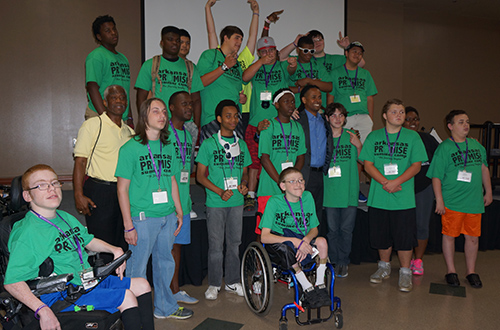
"PROMISE is changing me," a teenager was overheard saying near the end of the weeklong Arkansas PROMISE project summer camp in July.
Those words mean the project is working.
PROMISE is a federally funded research project based at the University of Arkansas. It is designed to improve the education and employment outcomes of teens with disabilities who receive Supplemental Security Insurance.
The summer camp gave teens a chance to explore career and post-secondary education choices but, more importantly, it gave them the opportunity to make new friends and to see themselves in places they may have never imagined.
"Many of these kids feel they don't belong to the community; they don't feel they fit in," said Brent Thomas Williams, associate professor of rehabilitation education and research at the University of Arkansas. Williams serves as principal investigator of the research grant. "We brought them to a college campus for a week and brought in speakers who talked to them about being successful in college and about taking ownership of their own self-advocacy. We wanted them to realize that they have just as much right to be on a college campus as anyone else."
Many of the teens shared their feelings with PROMISE staffers and in a public forum at the close of the camp.
One teen stepped up to the mic and said he thought the only way he could pay for college would be to enter the military first, but he learned there are other options. He also learned about trade schools where he could go to learn skills to get a good job.
"Several on Friday said either they hadn't thought about going to college or they hadn't thought that it was a possibility, either due to financial reasons or academic reasons," said PROMISE staffer Carri George. "Now, they are thinking about it and they also learned there are ways to manage their disabilities. That's the whole point for them to see that they have options, and it sounds like they are beginning to see that. It's working."
The same boy said he was nervous about coming to camp and didn't expect to make any friends. He described himself as a social outcast and was surprised that he did make many friends. He said coming to camp was both a wonderful experience and a learning experience.
Another camper said she didn't know any of the girls assigned to her group, but they quickly became friends and adopted a motto based on a children's television show that stressed the importance of family: no one gets left behind. The girl said her peers came to her when there were problems in the group.
Another boy said he learned not just about the educational opportunities but the challenges of living in a residence hall and the importance of being prepared for those experiences. He was pleasantly surprised at the quality of the residence hall food and that other students understood his sense of humor.
PROMISE provides two paid, summer work experiences to 1,000 teens with disabilities enrolled in the project. A second group of 1,000 teens is enrolled and receives only the usual services available to people with disabilities. Researchers will collect and analyze data from the two groups to help the federal government determine whether the PROMISE project should be used as a model for future programs.
PROMISE is funded by a $35.7 million grant from the U.S. Department of Education to the College of Education and Health Professions at the University of Arkansas and the Arkansas Department of Education. It's believed to be the largest research grant ever received by the U of A.
There were 163 PROMISE participants from around the state who traveled on chartered buses to camp, arriving on a Monday in July. They were divided into teams, wearing colored T-shirts signifying their team the rest of the week. Over the next five days, they attended sessions on topics such as healthy relationships, career planning and college choices that helped the teens focus on figuring out what they want to do and how to prepare, George explained. They took advantage of the many recreation opportunities on the college campus, attended a movie and dance and rehearsed and put on a talent show. They also heard from speakers who talked to them about their experiences living with a disability as they built successful careers and developed into strong self-advocates.
The program also involves the teens' family members with training, support and events. When the grant proposal was being prepared, several parents told the PROMISE staff their children had no exposure to any college campus in the years during which they made the transition to adulthood, George said. Both the summer camp sessions and monthly training topics during the grant period were based on research about what helps youth succeed in the long term, she said.
Parents and other adults also told PROMISE staff that living with a disability or caring for a youth who has a disability leaves both the parent and child feeling isolated at home, school, job and community.
At camp, poet LeDerick Horne spoke about his struggles growing up with a learning disability. He told the teens to check out accommodations available at educational institutions. He also talked about the importance of building your self-esteem and surrounding yourself with positive people who support you.
"I am the example I never got to see," said Horne, who in addition to his poetry has co-written a book titled Empowering Students with Hidden Disabilities: A Path to Pride and Success. "As a kid, I never saw an adult talking about their own disabilities."
Topics
Contacts
Heidi S. Wells, director of communications
College of Education and Health Professions
479-575-3138,